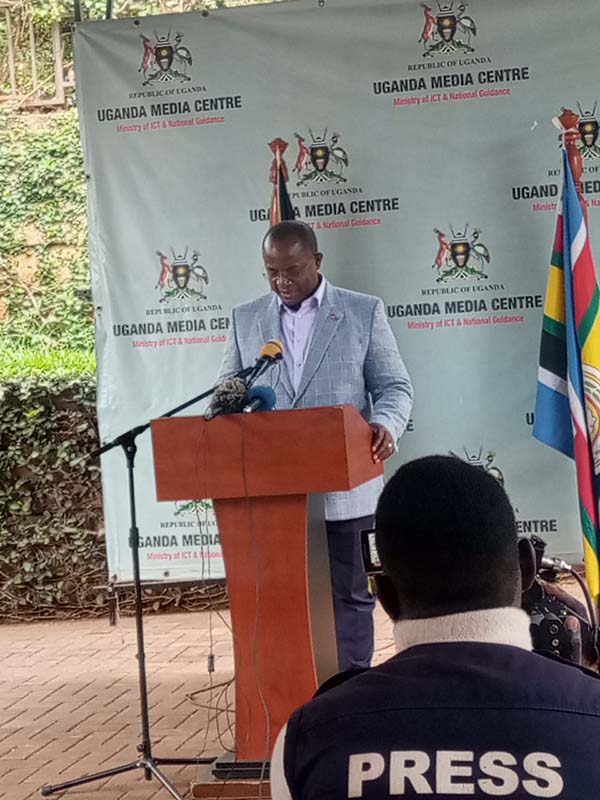

Protecting Vanilla Crops in Uganda
Vanilla is the most lucrative crop on the Uganda market, fetching up to $12 per kilogram (a metric unit of weight equal to 2.2 pounds) in the last December 2022 season. However, having vanilla mature until it can fetch the highest premium price has been a daunting task for farmers as thieves steal the crop shortly before it is harvested.
This means a loss for farmers who in most cases would have invested a lot in planting the crop.

Fred Bwino, state minister for agriculture declaring the June-July 2022 Harvest Dates in Uganda. Photo by Kiiza Kizito/CRS.
In Kayunga district, farmers have for years hired security guards to sleep in the gardens to deter thieves from stealing their vanilla. The story is similar for the other vanilla growing regions around the Rwenzori mountains.
“Our biggest challenge has been theft of vanilla. We have had to pay big sums of money to people to sleep in the gardens,” said Mukasa Jackson, a vanilla farmer in Kayunga district.
“If it was not for theft, we would be earning more than what we do,” says Bosa Muhamad a farmer from the Kayunga district.
Until recently, these farmers had no protection, however, in the past three years, key actors in the Uganda vanilla sector, led by Catholic Relief Services, have joined forces to protect farmers and the country’s reputation as a source for high quality vanilla.
CRS in partnership with the Ministry of Agriculture, Animal Industry and Fisheries, the Sustainable Vanilla Initiative, an international vanilla industry association, and the Vanilla Exporters Association, a Ugandan vanilla trade organization, have engaged both district and national government structures for a regulatory framework to protect and promote high-quality vanilla through declarations of harvest dates.
In addition to advocating for harvest dates, CRS, has facilitated the development of by-laws and ordinances at the district level to protect the crop and stop theft.
Because of these measures, Buikwe district, for instance, has already chosen vanilla as a strategic enterprise envisioned to improve its farmers lives.
According to Maurice Kaynabadde, Buikwe district agriculture officer, the bylaws they have put in place have ensured quality production of vanilla in the district. With the district ordinance now at the solicitor general for approval, the district is working with the agriculture police to enforce policies on vanilla growing.
“Vanilla harvest dates have helped us to regulate and control the harvest of vanilla. As I speak, even unscrupulous buyers no longer tamper to buy before the harvest dates. Our farmers now value quality harvest because they are aware that if you sell vanilla before it’s mature you make loses,” says Kyambadde. “In the next 10 years, we see a tremendous increase in production of high-quality vanilla in Uganda and Uganda as a preferred source of vanilla.”
With the money from the vanilla harvest farmers have been able to pay school fees, improve their homes, and, even buy more land for their families.
Uganda’s vanilla, mostly exported for beverage and pharmaceutical production, accounts for 5% of global production and is in demand due to its high vanillin content, the natural ingredient that gives the rich vanilla taste and smell. Uganda’s rich soil, two rainy seasons and skilled farmers are added advantages for a top-quality Ugandan vanilla.

